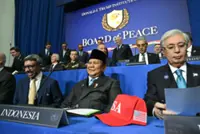JAKARTA: New import restrictions are roiling supply chains and causing concern among companies including foreign investors in the automotive and electronic industries, who are warning of stockouts and temporary production stoppages.
The curbs affecting finished goods, as well as intermediate goods and raw materials categorised under 2,400 harmonized system (HS) codes across 18 sectors, have set off alarm bells among businesses and prompted business chambers to request a reassessment.
“We completely support the regulation’s objective to block illegal imports, but we need to find a much more workable system,” American Chamber of Commerce in Indonesia (AmCham) managing director Lydia Ruddy told The Jakarta Post on Thursday (April 4).
While the policy applied to many sectors, “it has become a huge problem for many foreign companies especially in textiles and footwear, electronics, health supplements, cosmetics and tires,” she continued.
Companies reliant on imported products with no suitable domestic alternatives would be hurt, she continued, noting that some AmCham member firms were unable to conduct necessary imports and were having permits denied. If the issue persists, “this will dampen investment appetite,” warned Ruddy.
The government argues that the new rules, based on Trade Ministry regulations No. 36/2023 and No. 3/2024 as well as Industry Ministry Regulation No. 6/2024, are aimed at curtailing illegal imports and promoting domestic production, but businesses say they disrupt operations of many companies connected to global supply chains.
Members of the foreign business community who requested anonymity have told the Post that multinational companies have expressed concern over the new rules, citing significant cuts to import quotas, delays in permit issuance and a cumbersome import-licensing system.
They estimate potential losses from the import restrictions due to production stoppages and halted exports to be in the tens of millions of dollars. Other companies have also raised the urgency of the matter.
Apple MacBooks supplies in Indonesia could dry up by the end of April, while other goods, including Michelin tyres and chemicals shipped from Europe will face similar depletion risks in the coming months, Bloomberg reported on Friday, citing unnamed sources.
When contacted by the Post, a representative from Apple declined to comment, while Michelin representatives did not immediately respond to a request.
Lee Kang Hyun, chairman of the Korean Chamber of Commerce in Indonesia (KoCham), said on Wednesday that, while businesses understood the government’s motivation for responding to the negative impacts of imports amid the growth of local industries, only a few companies had received import approval.
Most Korean companies had refrained from requesting import approvals since February, due to concerns about rejections and shipping-related issues arising from the new regulations, he pointed out.
Despite urgently filing for approval in March, these companies had yet to get the green light for imports.
“A few of our companies reported they are on the verge of production stoppages due to running out of stock this month,” Lee pointed out, without naming names.
“Financial losses and supply chain disruption are inevitable with the delays in the import license application system.” Donna Priadi, executive board member of the European Business Chamber of Commerce in Indonesia (EuroCham) said the regulation was enforced “indiscriminately”, regardless of “industrial sector readiness”.
A lack of readiness, she added, caused problems for downstream industries reliant on imported raw materials and the upstream sector that were underdeveloped and unable to provide viable domestic alternatives, and as such they were “forced” to source materials at higher costs.
Similarly, British Chamber of Commerce in Indonesia (BritCham) chairman Chris Wren raised concern about the “hurry” to implement the policy without adequate evaluation and time to receive input on shortcomings, leading to “serious supply chain shortages and commercial implications”.
This situation added to the growing risk of perceptions regarding the “ease of doing business” in Indonesia, he said. Government officials denied allegations of holding back import permits.
Trade Ministry Foreign Trade Director General Budi Santoso told the Post on Friday: “We’re not holding back import permits, including those for electronics.” Separately, Industry Ministry spokesperson Ronggolawe Sahuri said technical rules on raw materials for industrial purposes had been stipulated, without specifying further details on other sectors.
“We have processed permits for some,” Ronggolawe said on Friday, “while other applications were returned to businesses for not meeting the required criteria and needing additional information.”
The situation was also harming domestic manufacturers across subsectors, as the import restrictions by the Trade Ministry regulation covered about 70 per cent of goods traded domestically, Indonesian Employers Association (Apindo) chairwoman Shinta Kamdani told the Post on Friday.
“This [issue] could take months before any approval is issued,” Shinta noted.
“[Apindo] is particularly concerned about the import needs of export-oriented and labor-intensive industries, because the negative economic impact could be systemic,” Shinta said, warning about a possible toll on national economic growth.
Center of Reform on Economics (CORE) executive director Mohammad Faisal suggested the government might have been “too hasty” in calculating the regulations’ effects, since they had added problems that could exacerbate the decline of local industries rather than strengthening them, but he cautioned against allowing imports to proceed “freely”, as that also posed risks to the local economy.
“Indonesia’s [ability] to [build] domestic supply chains is still limited, particularly in sectors like electronics and automotives,” he said.
“Perhaps, the government can reevaluate the [import] rules and local content policies, while still pushing ahead with them.”
While acknowledging the risk of prolonged disruption deterring investment, Faisal highlighted Indonesia’s enduring appeal for foreign investors: “Indonesia has a strong domestic market, a significant advantage foreign investors won't easily abandon.”
Indonesia retained its position as the second-largest recipient of foreign direct investment (FDI) inflows in the region as per 2022 figures, with manufacturing drawing over half of the country's FDI, according to the 2023 Asean Investment Report published by the Asean Secretariat. - The Jakarta Post/ANN





